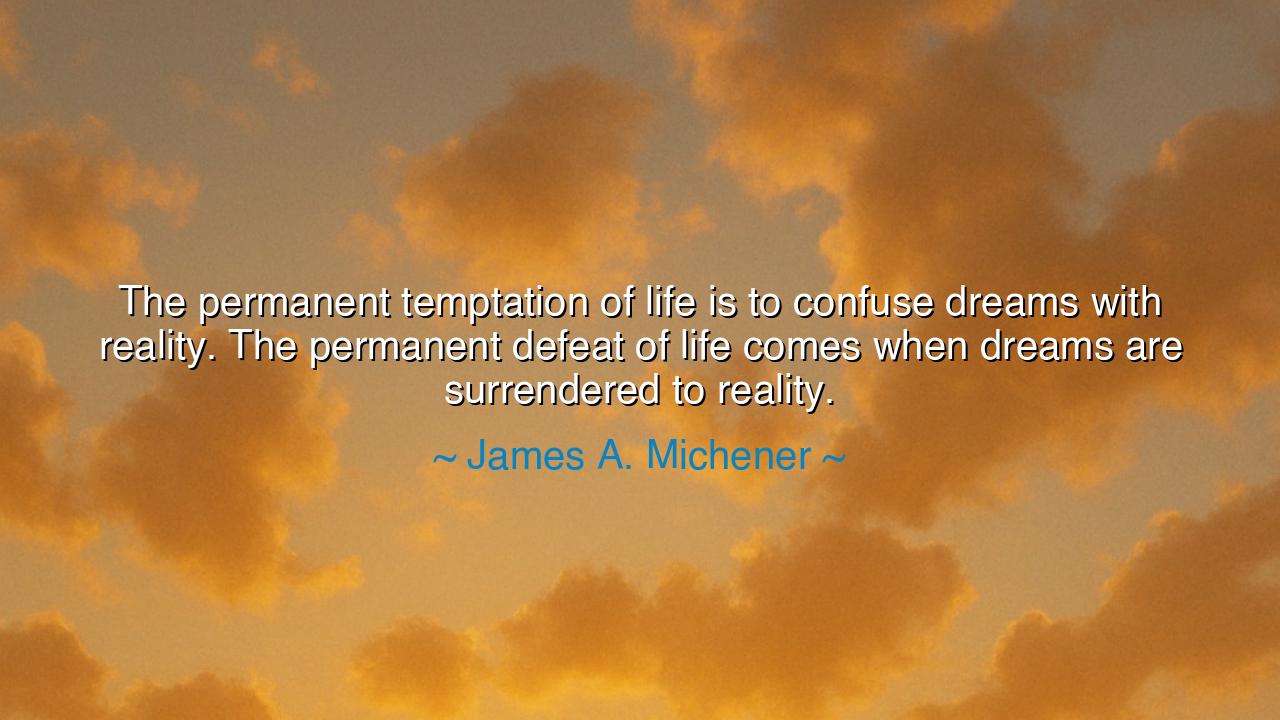
The permanent temptation of life is to confuse dreams with
The permanent temptation of life is to confuse dreams with reality. The permanent defeat of life comes when dreams are surrendered to reality.






The War Between Dream and Reality
Among the writings of the wise, there are few words as piercing and profound as those spoken by James A. Michener, the great storyteller of lands and lives: “The permanent temptation of life is to confuse dreams with reality. The permanent defeat of life comes when dreams are surrendered to reality.” These words strike like a bell across the ages, for they touch the eternal struggle within every soul—the tension between what is and what might be, between the visible and the imagined, between the world that confines us and the dream that calls us beyond it.
The origin of this wisdom lies in Michener’s own life, for he was a wanderer of both earth and mind. Born in humble circumstances, he traveled across continents and oceans, writing of civilizations and hearts, weaving together the great tapestry of human longing. He saw empires rise and men crumble under the weight of practicality. In his journeys, he learned that mankind’s greatest peril is not failure, but surrender—the quiet death of vision that comes when one mistakes the prison for the world, and ceases to dream of freedom.
When Michener speaks of the temptation to confuse dreams with reality, he warns against the delusion of living only in fantasy, of mistaking desire for achievement. There are those who dream greatly but never lift their hand to labor. They imagine triumph without trial, harvest without sowing. Such dreaming, he says, is illusion—it intoxicates but does not build. The dream that is never tested by action is as fleeting as mist upon the morning sea. It may comfort the heart for a time, but it leaves no mark upon the world.
Yet Michener’s second truth is more tragic, and more profound: the defeat of life comes not from those who dream too much, but from those who cease to dream at all. For when the dream is surrendered to reality, when hope bows to circumstance, the soul begins to wither. The realist who has killed his imagination may walk through life efficiently, but he walks through it hollow. Reality, untempered by vision, is a barren land. Without dreams to challenge it, it becomes a wall around the human spirit.
The ancients understood this peril. Consider the story of Galileo Galilei, who looked through his telescope and saw moons circling Jupiter. The world mocked him, the church condemned him, and reality declared him wrong. Yet Galileo did not surrender his dream of truth. He lived under house arrest, but his vision—his dream of a universe greater than mankind’s arrogance—outlived his captors. Centuries later, his defiance became humanity’s triumph. From his pain, Michener’s words are made flesh: reality may cage the body, but it cannot conquer a mind that dares to dream.
It is in this balance that life must be lived. To dream without discipline is folly; to live without dreams is despair. One must hold the two as a craftsman holds fire and clay—too much of one, and the form collapses; too much of the other, and the fire consumes it. Dreams give life direction; reality gives life foundation. Between them lies the art of creation, the work of making what was once imagined into what can be touched, seen, and shared.
James A. Michener thus calls to every generation: do not abandon your dreams to the cold stone of reality, nor let fantasy steal your will to act. The wise dreamer is not one who escapes the world, but one who redeems it—who takes the raw matter of existence and breathes into it the spirit of possibility. To live rightly is to walk with both eyes open: one fixed upon what is, the other upon what could be.
So, my children of thought, remember this: the world will always try to convince you to settle, to shrink your vision until it fits its limits. Do not yield. Let your dreams challenge the world, even when the world resists. Work for them, bleed for them, build for them—but never forsake them. For when the dream dies, so too does the noblest part of man. And though reality may rule the day, it is dreams that light the night—and through them, humanity finds its way forward.






AAdministratorAdministrator
Welcome, honored guests. Please leave a comment, we will respond soon